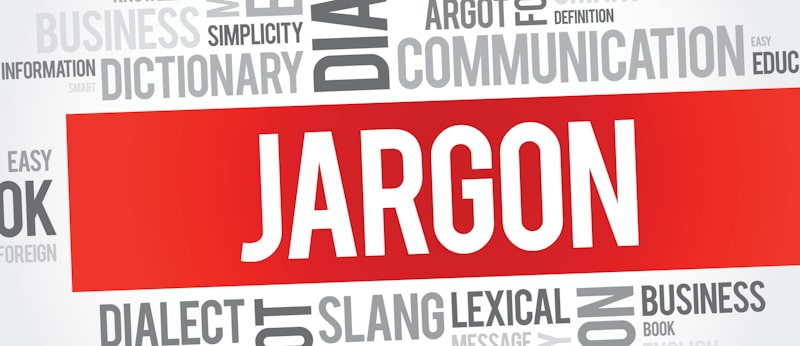A writer or speaker’s objective should always be to communicate effectively. If that entails the use of special or “jargon” words, so be it. But if there is no need to use lesser-known terms in the script or conversation, steering clearing of them is recommended.
To properly use the word “jargon” in a sentence, make sure the word is denoting a thing, event, or concept that’s not common knowledge or general speak. On the other hand, if you are using jargon-like terms in your texts or speech, make sure it’s confined to a circle of people who comprehend them.
Keep reading to learn more about jargon, the different jargon used in various fields, the significance of jargon and why and when you should avoid them, etc.
Jargon – Definition
The term “jargon” basically refers to any word or phrase that regular people or individuals outside of a certain group cannot comprehend. It is typically a specialized language used by an occupational group or professionals. Though the language is necessary for people within the group (it helps them communicate with precision and clarity), it doesn’t mean anything to people not part of the clan.
Jargons are usually abstract words, unfamiliar terms, acronyms, abbreviations, and even non-existent words, with some euphemism thrown in occasionally. Every industry, organization, trade, and/or profession has its own set of specialized terms. Some industry or profession-based jargons are:
- Economists: marginal-cost pricing, cost-push inflation, J-curve
- Computing: RAM, ASCII, intranets, disk drive
- Insurance: arbitrate, annuitants, gilts, debentures, the sum assured
- Photography: f-stop, ASA rating, TTL metering, teleconverter
Some professions resort to so much jargon that their specialized languages have their own names, such as “legalese” and “academese”. Therefore, any piece of text that’s filled with legalese, academese, or words specific to a particular field gets called out for being “jargony”. Also, jargon could at times be referred to as “argot” or “lingo”.
Kindly note, not all words or phrases a reader doesn’t understand go down as jargon. If the reader is not knowledgeable enough to interpret a fairly regular term, the term cannot be labeled as “jargon”.
If you’re not sure how to differentiate between jargon and a non-technical term, find out if the word has alternate or easier-to-understand substitute words. If there are no replacement words, it’s not jargon. If the word has much simpler synonyms, the original term is certainly jargon.
Difference Between Jargon And Slang
“Jargon” and “slang” are not the same. Though slang is also used within certain groups of people, it’s colloquial or a bit too casual and, therefore, not ideal within business settings or for serious conversations. Jargon is formal language specific to a discipline; slang, on the other hand, is not so and is less likely to be used in written texts – at least not in formal writing.
“Amicus curiae brief” is legalese or legal jargon. It’s a Latin term that is translated as “friend of the court”. Slang terms or phrases include:
- Lit: when something is enjoyable or exciting
- To ghost someone: cutting off communication with a person you are no longer keen on talking to
- To flex: to show off
Why Do People Use Jargon?
Most people who use jargony language may be doing so because it helps them be succinct with their words and also maybe that’s the way they speak. Most writers, in fact, use jargon sub-consciously and realize they did so only when pointed out or heavily criticized for it by their readers. Their knowledge about a topic and related vocabulary could be so broad, they may not consider the terms or phrases they incorporate into their texts as “jargon”.
Why Is Use Of Jargon Looked Down Upon?
Using jargon in oral communication and written correspondence may help people within a certain group standardize their language. But it, without a doubt, is annoying to people who do not get it.

The feeling of not being able to comprehend a language one considers as their own can be hard to accept, and that is why jargon is frowned upon by people who don’t get the esoterism. It deters their understanding and slows down reading progress. Slang, or the language of the millennials and Gen Z, can be annoying to Generation X and baby boomers, for instance.
Though looking up the foreign word or phrase won’t take much time, it still is one more thing to do that most readers won’t be too keen on. As a communicator, your objective should be to explain a concept or topic to your readers and not focus on helping them build their vocabulary. People do not click on an article link or buy a book hoping to learn new words.
If you do push your readers against the wall or make them do research while reading your texts, you’ve most likely lost them. Some might pretend to understand to massage their own ego, but they won’t be able to act or reflect on what they just consumed. All their time and effort, as a result, would have gone to the bins. This also means you failed as the author of your piece.
How To Properly Use “Jargon” In A Sentence
As mentioned above, proper usage of the term “jargon” in a sentence depends on the context. If you’d like to point out in a sentence that certain terms being used are not regular words, use “jargon” in your sentences to pinpoint that so those who don’t understand would try to know better.
If you are using jargon (not the term “jargon” per se) in your correspondences, make sure those help you keep your points forward effectively and efficiently. Though jargony words usually work within certain groups, there are at times chances of those terms going over the heads of people in the same group.
For example, new doctors or fresh medical school graduates may not be able to comprehend certain hospital-specific terms senior doctors might use during team briefings. The doctors concerned should, therefore, make conscious efforts to communicate in simpler language when interacting with noobs within their fields.
Jargon As Euphemism
Jargon, quite often, could be used to communicate or send a message across in the most platonic way possible. For example, human resource (HR) departments do not resort to the usage of words such as “fire” or “sack” in their correspondences when terminating employment. Here are typical HR language or jargons employed instead:
- downsizing employment
- career-change opportunity
- employee reduction activities
- negative employee retention
- redundancy elimination
- strategic downsizing
- selecting out manpower
In the military, the following phrases could be used instead of the corresponding plain language:
- render non-viable (kill people)
- armed reconnaissance (bombing enemy troops)
- friendly fire or incontinent ordinance (bombing own troops)
Here are some other jargons with their general word substitutes:
- negative economic growth (recession)
- involuntary undomiciled (the homeless)
- environmental hygienist (janitor)
- vehicle appearance operative (car-washer)
Acronyms As Jargons
Though not jargon per se, certain acronyms and abbreviations could also be viewed as such. Here are a few examples:
- VP (vice president)
- CCTV (closed-circuit television)
- RAM (random access memory)
Acronyms can be ambiguous or may get perceived as jargon if they are not expanded upon in parentheses or elaborated on right after.
Example Sentences With The Word “Jargon”
The following is a list of sentences using the word “jargon”, and not jargony terms:
- Here’s her guide to medical jargon.
- Our use of jargon in our marketing material depends on the market we are catering to.
- She talked to me in incomprehensible jargon for the first 10 minutes.
- People often postpone their decision to create a will so that they could stay away from all that legal jargon as much as they can.
- She has good storytelling skills, primarily because she doesn’t use “pretentious” jargon.
- It either risks falling into jargon territory or coming across as truly insincere.
- There is a whole subculture of symbolism and jargon that offers us zero reference points.
- She doesn’t resort to time-consuming processes nor culinary jargon.
- Make clear, salient points – steering clear of jargon and needlessly complex data.
- It’s now time to demystify some jargon.
- Philosophers are infamous for using incomprehensible jargon in their speeches and writings.
- Avoid long rambling texts, unexplained acronyms, or jargon.
- Write concisely and clearly and avoid obscure terminology or jargon.
- Technical jargon works when used sparingly.
- Do you stuff your press releases with verbose journalese, jargon, and business buzzwords?
- There are certainly reliable websites that help regular people interpret copyright law and related jargon.
- If people do not understand a certain concept or thing, they waste no time in labeling it as jargon.
Here are a few sentences with jargons in bold, followed by their actual meanings in parentheses:
- I require a script for picking up the medicine. (prescription)
- Her objection was overruled. (canceled or reversed)
- We need those figures, but they are siloed in the finance department. (cut off, segregated, held separately)
Conclusion
What’s commonly understood by a group of people could be alien language to people outside the designated clan. While there is no harm in using jargon when the communication is inter-group, it’s not wise to employ technical or field-specific terms in conversations that involve people from all walks of life.
When using jargon within a close circle, you come across as smart and efficient. But when you use the same set of words outside your sphere, you risk being perceived as a snob or a pretentious person.
Long story short, if you’re communicating with your peers, use jargon in your speech or writing. If, however, you are trying to explain things in the simplest words possible, steer clear of all jargony language.
Shawn Manaher is the founder and CEO of The Content Authority. He’s one part content manager, one part writing ninja organizer, and two parts leader of top content creators. You don’t even want to know what he calls pancakes.



